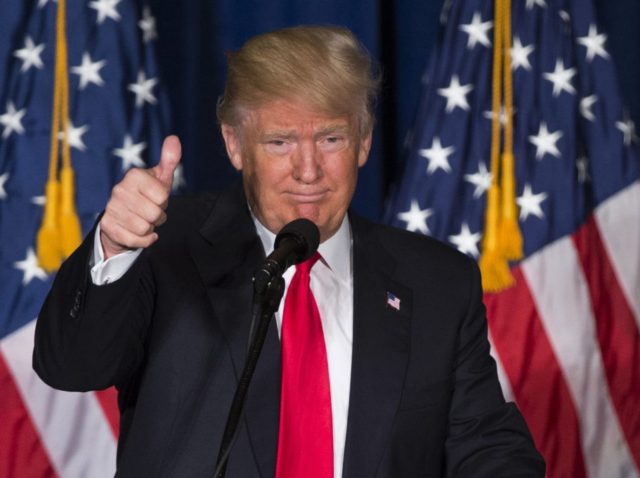The results are in.
Trump’s foreign policy speech made the right enemies… again.
National Review hated it; Slate hated it; The New York Times hated it; MSNBC hated it; CNN hated it; The New Yorker hated it; The Daily Beast hated it.
Establishment pundits at The Washington Times, the Wall Street Journal, and the Economist hated it, and though he has not yet mentioned the speech, I am sure that Bill Kristol hated it; Charles Krauthammer and Senator Lindsey Graham certainly did.
Just about everyone in the establishment on both sides of the political spectrum hated it.
That is why all real conservative Americans should love it.
As I highlighted in February, Trump’s traditional American foreign policy is a refreshing departure from the bomb-away mentality of the modern Republican Party. Certainly Ron Paul offered a similar reprieve from American adventurism during his failed presidential bids, and Pat Buchanan made nonintervention a core theme of his run for the presidency in the 1980s and 1990s, but Trump has been able to rally more people around his candidacy and thus has made nonintervention sexy again.
Virtually all of the criticism of Trump’s speech has focused on the pre-World War II failed “America First” program made famous (or infamous if you are an establishment type) by Charles Lindbergh. Republican Senator Robert Taft later echoed this traditional strain of American foreign policy when he warned against aggressive American tactics during the Cold War, particularly in relation to Asia. The candle was not worth the wax. Eighty thousand dead Americans and their grieving families would probably agree.
It still must be asked, are Trump’s attacks against the establishment some wild roundhouse, or do they have a traditional American basis? Is nonintervention truly conservative, or is it simply a publicity stunt to get people to vote “Trump” after nearly twenty years of massive and bloody American intervention abroad?
Both George Washington and Thomas Jefferson considered neutrality to be the preferable American foreign policy position. Jefferson is the president who coined the phrase “entangling alliances” when he said in his First Inaugural Address that American foreign policy should be “peace, commerce, and honest friendship with all nations, entangling alliances with none.”
This did not make Jefferson a pantywaist yellowbelly. He aggressively put an end to the Barbary Wars with swift action against Muslim warlords, many of whom had enslaved Americans in North Africa. Trump has promised the same approach with ISIS. And, in contrast to the current administration’s mess of a foreign policy, Trump has pledged to work with European powers who are concerned about international Islamic terrorism. Zdrahstuiteh, Russia.
This is not an affront to traditional American foreign policy. James Monroe and John Quincy Adams proposed the “Monroe Doctrine” in part as a way to keep America out of Europe, but only when European affairs did not affect the United States. Clearly, international terrorism is a blight on both Europe and the United States, one that merits a unified Western response, not a conflicting mess of visions coupled with alliances to Middle Eastern powers that do not mesh with American or European interests, namely the destruction of international terrorism. See Saudi Arabia.
This tradition of “peace, commerce, and honest friendship with all nations, entangling alliances with none” was championed by virtually every president of the early to mid-nineteenth century.
Trump, in fact, sounds a lot like Martin Van Buren or Zachary Taylor.
- Trump: “My foreign policy will always put the interests of the American people, and American security, above all else. That will be the foundation of every decision that I will make.”
- Van Buren: “We sedulously cultivate the friendship of all nations as the conditions most compatible with our welfare and the principles of our Government. We decline alliances as adverse to our peace. We desire commercial relations on equal terms, being ever willing to give a fair equivalent for advantages received.”
- Taylor: “As American freemen we can not but sympathize in all efforts to extend the blessings of civil and political liberty, but at the same time we are warned by the admonitions of history and the voice of our own beloved Washington to abstain from entangling alliances with foreign nations. In all disputes between conflicting governments it is our interest not less than our duty to remain strictly neutral, while our geographical position, the genius of our institutions and our people, the advancing spirit of civilization, and, above all, the dictates of religion direct us to the cultivation of peaceful and friendly relations with all other powers.”
America First has a nice, traditional ring to it.
That is why every non-traditionalist inside the Beltway is going ballistic over Trump’s policy positions. They realize that Trump is going to change the game, and if successful he will torpedo their dream of international government built on Woodrow Wilson’s dream of “making the world safe for democracy,” and George H. W. Bush’s New World Order. That world order is based on failed Leftist one-world government and Leftist policy positions. The latest “global warming” agreement scam is a fine example.
Intervention has never been the conservative American position. Those running around yelling that Trump is not a conservative need a history lesson.
Better yet, a Trump presidency would ensure that these naysayers would be quickly educated.
America First is moving on to Cleveland and possibly Pennsylvania Ave. Perhaps the endless wars and pointless American bloodletting will finally stop under a Trump administration. In forty years, historians might call this period “America First.” Or maybe it will be the Age of Trump.
Brion McClanahan is a historian and author of the newly released, 9 Presidents Who Screwed Up America–and Four Who Tried to Save Her.

COMMENTS
Please let us know if you're having issues with commenting.